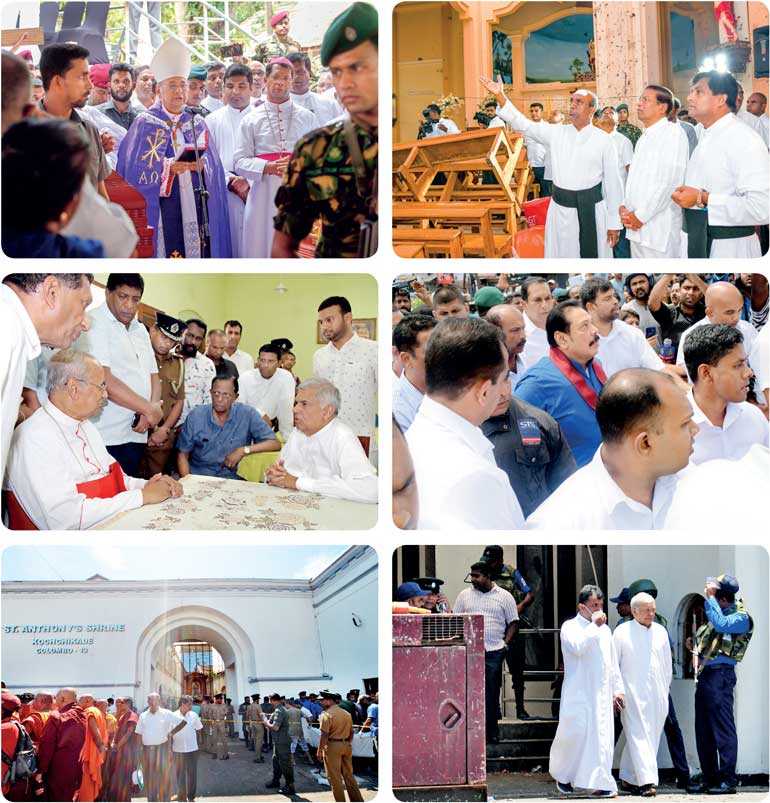Tuesday Feb 24, 2026
Tuesday Feb 24, 2026
Thursday, 25 April 2019 00:20 - - {{hitsCtrl.values.hits}}

These are the worst of times for us all in our belovéd blesséd battered bruised broken bleeding isle. And I’m thinking dark thoughts that the twitterati and other tender-minded philosophers would deem unprintable. But will be publish and be damned if you please, @y’all. Because despite the dying need for moderation, restraint, etc., there are some things worth saying. Think of it as a citizen – a Sri Lankan Christian – speaking truth to power: personal, political, religious, spiritual, diabolical.
Personal
Firstly, as a Christian, I take the Easter Sunday attacks personally. I was in church with people whom former US President Barack Obama is pleased to call ‘Easter worshippers’, in order to be inoffensive (to whom, really?). And for the first time, it struck me that I was a part of a vulnerable minority in the great game that presidents, princes and other powers as may be play… with people like us as pawns.
Don’t get me wrong – I’m a Sri Lankan and (often, though not that often these days) proud to be so. But despite the best attempts of craven politicians to characterise these dastardly attacks as terror against an entire nation – which they are – it felt well and truly personal. I’m trusting that Hindus who felt heaven raining aircraft-borne ordnance on their homes, Buddhists who remember the attacks on the Sri Maha Bodhi and Dalada Maligawa, and Muslims from Kalutara to Kandy Districts will resonate with the sense of being instruments in the hand of violent, invasive, parasites – deadly viruses with anonymity and impunity to cloak them…
Political
Secondly, but not necessarily secondarily, as a Sri Lankan citizen I take the response and responsibility of the political establishment at this watershed in our national course of events very personally. Despite the cabinet of ministers’ bumbling fumbling (sometimes mysteriously funny … to them) ‘apology’ to the nation, I am neither amused nor placated.

Rather, I’m incensed that neither the President – who mouths glib platitudes with little aplomb and less aptitude than ever – nor the Premier, who failed to attend his own presser, have apologised to the nation at large. Instead, they’ve chosen – like children afraid of being caught with the C4 or claymore when the music stops – have passed the cushion in utterly puerile fashion.
To add insult to injury, there was that inane – or do I mean insane? – farrago of gibberish from the Defence Secretary on how and why intelligence is to be used… and one’s brains not. Is death by terror quantifiable in terms of numbers? Do we not pay our taxes so he and his like can safeguard every citizen in and visitor to our island? Is an emergency necessary to underline that basic responsibility of the state?
In fact, it almost (I said, ‘almost’) makes one yearn for the good old bad old days when strongmen-bureaucrats knew their business, tough and terror-driven as it was. I know my regular readers will relish the sense of irony in such dire daydreams. But the time of the samurai-mandarin may well be upon us again if democratic-republicans don’t cease and desist soon enough from running around like headless chickens and calling each other juvenile names.
Religious
Thirdly, I am moved to impious wrath at the pusillanimity of our clergy taken as a whole (although many if most of them are better left than taken). Their passivity in the face of blatant radicalisation of some members their flock, turning black sheep into grey wolves, beggars belief.
The mainstream communities of faith that have dwelt beside their ‘other’ brothers and sisters may be mostly innocent of any malice – I’m convinced of it, as are many of their neighbours. That few if any clerics of any persuasion spoke out in time against the indoctrination of a new lost generation of youth – in the east this time, not the north – is a cause for bitter regret.
Though no doubt some misguided dervish of a propagandist somewhere at home or abroad is rejoicing at the grisly work of their protégés’ hands? There is no reckoning or reasoning with such devilry, except perhaps to turn the other cheek and ‘forgive and forget’ as a cardinal leader of a wounded cross-bearing community recently said in the aftermath of bloody holy week.
Spiritual
Fourthly, as observers of international events, we cannot remain agnostic to global movements militating against the peace of Sri Lanka.
In the east, a ‘road’ is being built that will make us but a loop in its ‘belt’, which has the First World properly alarmed. To the north, the forces of sectarian politics are gathering strength in an ironically secular republic, which bodes ill for the pluralism and inclusivity we desire for our pearl in their Indian Ocean. While in the West … well, some things are best left unsaid – especially if they’re based on speculation or suspicion. But while fingers point at the usual suspects like Pakistan as sources of origin for radicalised cadre, the radical origins of shadowy would-be caliphates are mysteriously shrouded and not easily sourced to strategic or central intelligence agencies.
If you’re Wimal Weerawansa, you’ll smell a rat in recent events; going as far as alleging that it’s all a conspiracy to open a door to western agency in our backyard – US gunships off Trinco and all! If you’re Ranil Wickremesinghe, you might characterise gunboat diplomacy as a thing of the past and welcome global intervention (some call it help) in Sri Lanka’s insoluble national problems.
If you’re an islander like me – national-minded but not nationalistic, and patriotic without being patronising – you’ll sense that the truth lies somewhere in-between. It’s a tangled web that seasoned politicians weave when still they practise to deceive. To what end, it is not immediately clear. But the battle lines are being redrawn. And it is incumbent on Sri Lankans to eschew isms and schisms, and stand and stick together. National leaders are clearly incapable of defining a singular national policy in an inviolable national interest.
Therefore it redounds on citizens in our nation-state to draft a new social contract. Short of anarchy, this means working in fits and starts from the street level up to delineate a new national identity that not only critically engages identity politics based on ethnicity and religion, but integrates all citizens in a fresh symbiosis of family, friends, and neighbours. It’s the only kind of spirituality that will be a safeguard against the excesses of ISIS or other throne, powers, and dominions seen and unseen.
Diabolical
Fifthly, while smiling with grim amusement at the oxymoron of ‘military intelligence’, we must realise that no amount of knowledge can trump cowardice, greed, stupidity and those human weaknesses that characterise all of us.
As a defence establishment, the political powers have failed at all but passing the buck – as epitomised by Prez and PM. As key defence personnel, we lack the sense and sensibility to say and do the right things at the right time, as evinced by the Def Sec’s pathetic attempt to justify the intelligence fiasco.
As a saving grace, it is only the courage of the soldier, sailor, airman and policeman on the street that justifies any expenditure of defence – our hats off to their hearty fortitude and sacrificial rush to secure the safety of all Sri Lankans.
Last but by no means least, everyone concerned in the cataclysm of the weekend is a loser. From the losers who run the show to the grieving who lost their life, limb or loved ones. From the alleged former terrorist defending a previous regime on television to the alleged drug kingpin doing the same favour for the present dispensation on the same show. From the imam or mullah who holds out heavenly bliss in exchange for grievous bodily harm to the pontificating prelate scoring cheap personal and political points to the nobly silent prelates who can afford to ignore the samsaric agony around them in favour of nirvanic non-attachment to the distant pain of their earthly fellows.
True, for each of these egregious examples there is a countervailing one: a school of pacific masjids, a legion of humble simple clerics embracing a gospel of peace as much as social justice, noble monks venerating the dead at the graveside. But in a milieu where innocents are radicalised for globalist agendas, religious communities instrumentalised for political purposes, and agents operationalised against their fellow human beings for diabolical reasons not easily fathomed – we are all losers.
If, then, we can see the humanity – or lack or perversion of it – behind all the players in the ongoing tragic drama, perhaps some of the loss will lose its sting? To be the hapless victims of political or religious oppression is a bitter pill to swallow. It is a slow suicide for those who have already undergone egregious tension, tragedy and trauma. If the perpetrators and the planners as much as the people who failed to prevent this unprecedented national disaster can be stripped of their politics, faiths and philosophical persuasions, perhaps we islanders can see ourselves in their faces – our own masks of apathy, ignorance, prejudice and bias stripped.
Cold comfort and far too preachy? Maybe! Permit, if you will, me to include myself in the frame. I, too, have failed to be grateful for and safeguarding enough of an ephemeral peace won through hardship and horrors. I had forgotten the sacrificial cost of others to win me safety and security. Now as I together with you stand exposed to wrack and ruin, and the prospect of devastation again, I stand, like you, in desolation but not despair. There is hope in humanity not because of our strength but in our recognition of a shared failure and weakness, and in that is our salvation.
(Journalist | Editor-at-large of LMD | Writer #SpeakingTruthToPower)